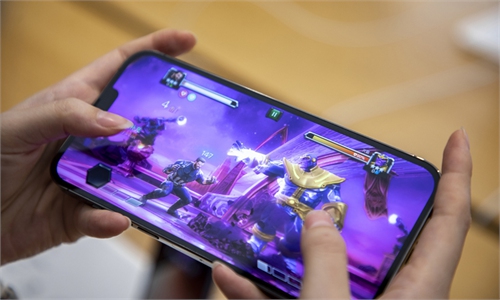China’s move to resume approval for new game titles boosts industry confidence to develop more high-quality products
China’s resumption of licenses approval boosts industry confidence

A couple play mobile games. Photo: VCG
The long-expected resumption for the approval of licenses for new game titles early this week has greatly excited domestic gaming circles, which are both technically and mentally well-prepared to promote sustainable development of the sector by complying with anti-addictive measures while also seeking overseas markets with high-quality products.
The National Press and Publication Administration announced on Monday the approval of licenses for 45 new game titles after more than eight months since game licensing was paused.
The administration announced on its website the approval of Dreams Sailing's license, a game developed by Shenzhen-listed game developer 37 Interactive Entertainment, along with other 44 games which also received licenses on Friday. However, titles from Tencent and NetEase, two heavy-hitters in the industry, were noticeably absent from the list, which was dominated by small developers.
The resumption of video game licensing has widely excited domestic gaming circles. "Of course, that's what domestic firms have long expected, after all, we have such a large gaming market in China," Jeremy Jia, a senior investment manager engaged in the video gaming sector for years, told the Global Times on Tuesday.
Liu Dingding, a Beijing-based independent tech analyst, told the Global Times on Tuesday that the resumption of releasing licenses plays a crucial role in boosting industry confidence, especially creating equal opportunities for small game developers that rely on one or two products for survival.
Rare licenses
In China, game firms need to file applications to local authorities for the approval from the publicity authorities. The completion of this process means that game developers can monetize their new titles through means which include in-game purchases.
In 2018, domestic gaming licensing was halted, a move which lasted 265 days. This time, the process was suspended for 263 days, but industry insiders said the impact is more serious because of a slump in the total amount of licenses approved. Public data showed that the number of new game titles approved in 2021 stood at 755, only 8 percent compared with 2017 levels.
In August 2021, the National Press and Publication Administration released the strictest rules aimed at preventing minors from becoming addicted to online games. It required online game providers to offer only one-hour services to minors from 8 pm to 9 pm on Fridays, Saturdays and Sundays, as well as on official holidays, while urging strict implementation of real-name registration and logins.
The suspension of license approvals was seen as doubling down pressure on domestic gaming firms which have been grappling with tougher internet regulations intended to improve legal compliance in the platform economy and foster more sustainable growth.
A typical example is the social networking and gaming giant Tencent.
Tencent's revenues grew 8 percent year-on-year to 144.2 billion yuan ($22.63 billion) in the fourth quarter last year, the company's financial disclosures revealed in late March. This was the internet giant's slowest quarterly revenue growth ever. For the whole of 2021, Tencent's revenues rose 16 percent to hit 560.1 billion yuan, which was the slowest yearly revenue growth on record.
Going overseas
The resumption of approval for new game titles means the end of the latest round of review and rule tightening in the domestic gaming industry, but the more targeted regulations will promote high-quality and long-term development in the sector, according to industry analysts.
An industry insider who preferred to be unnamed told the Global Times that there may continue to be a cap on the number of new games, but it cannot be ruled out that larger batches will continue to receive licenses in a short period as game developers continue to make license applications.
Jia said that domestic firms have prepared well both technically and mentally to better comply with regulations such as those targeting gaming addition among minors.
Despite twice suspending the issuance of new licenses, authorities aim to strengthen the protection of the youngsters while acknowledging the cultural value of high-quality games and encouraging their going overseas, Liu said, noting that many small game developers fought for self-survival during the period.
According to the data released by SensorTower, the revenue generated by Top 30 Chinese mobile games going global totaled $11.5 billion in 2021, 1.2 times of that recorded in 2020.
Jia said that multiple gaming firms have already mapped out in the overseas markets amid uncertainties of license approval in domestic market.
"With the gradual improvement of game production and operational capabilities, some domestic gaming firms could now perform well in overseas markets especially the developed European and North American markets, enabling them to compete in international markets," said Jia.
"It could not say that going overseas is a focus development for those firms, but it does have become a necessary option in terms of business layout, just like putting eggs in different baskets to manage risk," he said.
Many domestic game production teams are willing and endeavoring to export Chinese culture, and have the vision of making world-class games, not just for short-term traffic or monetization, according to Jia.

